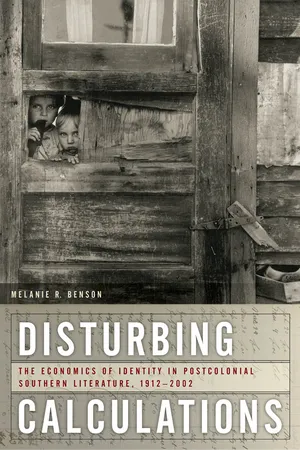
Disturbing Calculations
The Economics of Identity in Postcolonial Southern Literature, 1912-2002
- 280 pages
- English
- PDF
- Available on iOS & Android
Disturbing Calculations
The Economics of Identity in Postcolonial Southern Literature, 1912-2002
About This Book
In Thomas Wolfe's Look Homeward, Angel, Margaret Leonard says, "Never mind about algebra here. That's for poor folks. There's no need for algebra where two and two make five." Moments of mathematical reckoning like this pervade twentieth-century southern literature, says Melanie R. Benson. In fiction by a large, diverse group of authors, including William Faulkner, Anita Loos, William Attaway, Dorothy Allison, and Lan Cao, Benson identifies a calculation-obsessed, anxiety-ridden discourse in which numbers are employed to determine social and racial hierarchies and establish individual worth and identity.
This "narcissistic fetish of number" speaks to a tangle of desires and denials rooted in the history of the South, capitalism, and colonialism. No one evades participation in these "disturbing equations," says Benson, wherein longing for increase, accumulation, and superiority collides with repudiation of the means by which material wealth is attained. Writers from marginalized groups—including African Americans, Native Americans, women, immigrants, and the poor—have deeply internalized and co-opted methods and tropes of the master narrative even as they have struggled to wield new voices unmarked by the discourse of the colonizer.
Having nominally emerged from slavery's legacy, the South is now situated in the agonized space between free market capitalism and social progressivism. Elite southerners work to distance themselves from capitalism's dehumanizing mechanisms, while the marginalized yearn to realize the uniquely American narrative of accumulation and ascent. The fetish of numbers emerges to signify the futility of both.
Frequently asked questions
Information
Table of contents
- Contents
- Acknowledgments
- INTRODUCTION: The Fetish of Number: Narcissism, Economics, and the Twentieth-Century Southern Ego
- CHAPTER ONE: The Fetish of Surplus Value: Reconstructing the White Elite in Allen Tate, William Alexander Percy, William Faulkner, and Thomas Wolfe
- CHAPTER TWO: Stealing Themselves Out of Slavery: African American Southerners in Richard Wright, William Attaway, James Weldon Johnson, and Zora Neale Hurston
- CHAPTER THREE: The Measures of Love: Southern Belles and Working Girls in Frances Newman, Anita Loos, and Katherine Anne Porter
- CHAPTER FOUR: Contemporary Crises of Value: White Trash, Black Paralysis, and Elite Amnesia in Dorothy Allison, Alice Walker, and Walker Percy
- CHAPTER FIVE: Re-membering the Missing: Native Americans, Immigrants, and Atlanta’s Murdered Children in Louis Owens, Marilou Awiakta, Lan Cao, James Baldwin, Toni Cade Bambara, and Tayari Jones
- CONCLUSION: Disturbing the Calculation
- Notes
- Bibliography
- Index